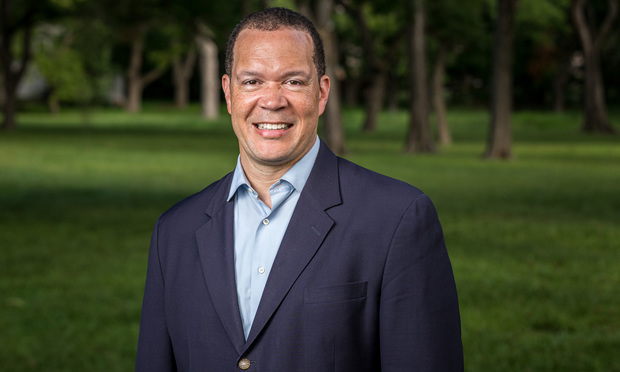Coping With COVID-19: Law Day, 'Constitutional Adaptability' and the 'New Normal'
As in-person society reemerges and we commence our integration from isolation, what is the relevance of Law Day to our profession and society in a COVID-19 environment? In our search for answers, we must reflect on our past.
April 29, 2020 at 10:00 AM
6 minute read
 Paul K. Stafford of Thompson & Knight.
Paul K. Stafford of Thompson & Knight.
Law Day (May 1, 2020) is an annual celebration of the rule of law, and the U.S. Constitution—a document embodying the rule of law that lawyers have taken an oath to protect and uphold.
The 2020 Law Day theme was adopted well prior to the COVID-19 pandemic, and is "Your Vote, Your Voice, Our Democracy," commemorating the 100th anniversary of the ratification of the 19th Amendment. Due to COVID-19, 2020 is now synonymous not only with the 100th anniversary of the 19th Amendment (and the 150th anniversary of the 15th Amendment), but with a year of unprecedented uncertainty and social and cultural disruption. The pandemic will eventually subside, yet the Constitution and the rule of law will remain; however, there is a commonality between the rule of law and our response to the coronavirus—it is adaptability. How lawyers respond and adapt to COVID-19 will in large measure define our profession now and for generations to come. As in-person society reemerges and we commence our integration from isolation, what is the relevance of Law Day to our profession and society in a COVID-19 environment? In our search for answers, we must reflect on our past.
'Constitutional Adaptability'—The Rule of Law, Not Rulings
Like the Constitution, our profession is continuously defined and redefined—simultaneously resisting and advocating for change—characterized by adaptability, articulated as progress. Consequently, the work of lawyers is less a concern about being "on the wrong side of history" than about a historical commitment of advocating for the positions of clients and causes—presumably in the interests of justice. As such, ours is a history of tension and contradiction, intertwined with the evolution of a democratic society. Lawyers may view themselves solely as upholders of the rule of law; however, history illustrates that lawyers are also agents of change.
For example, almost 250 years ago, lawyers and laymen declared this nation independent; however, for enslaved blacks, the struggle for liberty, justice and equal rights continued. In 1857, the U.S. Supreme Court ruled in Dred Scott v. Sandford that people of African descent were not citizens, and slaves were legal property; however, in time, slaves were emancipated (Emancipation Proclamation), slavery was abolished (13th Amendment), equality was protected (14th Amendment), and men formerly enslaved were acknowledged as citizens and enfranchised (15th Amendment). Afterward, segregation and Jim Crow were prevalent, and "separate but equal" was condoned through the Supreme Court's 1896 ruling in Plessy v. Ferguson, until overruled in 1954 by Brown v. Board of Education.
Also throughout this time, women were not only fighting to end slavery and promote equality for blacks, they were seeking relief from their own civil and political bondage—efforts reflected in the Seneca Falls Convention of 1848, and delayed by rulings such as 1875's Minor v. Happersett, in which the Supreme Court ruled that the 14th Amendment's citizenship guarantees did not extend to voting rights for women. However, after decades of being treated as less than citizens, women were granted suffrage through the ratification of the 19th Amendment in 1920, and have since been extended other protections against discrimination "on the basis of sex."
Fortunately, Law Day celebrates the rule of law, not rulings—a "constitutional adaptability" exhibited through the evolution of the law and jurisprudence. Otherwise, we'd be celebrating and commemorating Dred Scott rather than the Reconstruction Amendments, Plessy rather than the equality of Brown, and Minor rather than the 19th Amendment. Lawyers were an integral part of each of these historical events, as well as the promulgations thereafter—including the Civil Rights Act of 1964, the Voting Rights Act of 1965, and Title IX of the 1972 Educational Amendments. None of these historical moments—regardless of whether now considered dubious or morally inevitable—would have occurred without lawyers advocated for them. Stated differently, the profession that has greatly contributed to the maintenance of the status quo through upholding the rule of law has also played a pivotal role in the evolution and transformation of it. Accordingly, lawyers have multiple duties: to remember our history, to uphold the rule of law, to advocate for justice through change, to promote equality, and to strive to give true meaning to the Constitution.
Relevance and 'Detached Engagement' in the 'New Normal'
The COVID-19 pandemic has caused great disruption to our lives and altered our professional and personal lifestyles; however, as history illustrates and Law Day celebrates, the legal profession adapts to continue to promote notions of justice and equality. Professional representation and advocacy are key to this notion, as are community outreach and pro bono services. While in-person contact provides an invaluable opportunity for active engagement, technology is now paramount. In addition, what can be characterized as "detached engagement"—a more passive societal engagement that defaults to virtual interaction over in-person contact—will now become more prevalent across various ages and societal demographics and increasingly apparent as our societal reemergence proceeds. Lawyers must adapt to this "new normal" of virtual realities while emphasizing service, networking, professional development and mentoring. Well before the COVID-19 pandemic, most legal and community organizations provided opportunities for members to participate and serve virtually, receive updates digitally, and network remotely with members—particularly through email, webinars and social media. This continued digital and virtual platform is even more critical for the vitality and relevance of legal profession in a post-COVID-19 environment.
Our Constitution and our profession are dynamic organisms—living, breathing, impacting and adapting. In a COVID-19 environment, lawyers must uphold the rule of law and serve as agents of change to adapt to the challenges of today while creating the opportunities for tomorrow.
That commitment and strategic vision is what has distinguished this profession, and is what makes Law Day worthy of commemoration.
Paul K. Stafford is a business and insurance litigator at Thompson & Knight. He has served as an adjunct professor at Texas Tech University School of Law and at Texas A&M University School of Law, and served as 2012 president of the Dallas Bar Association.
This content has been archived. It is available through our partners, LexisNexis® and Bloomberg Law.
To view this content, please continue to their sites.
Not a Lexis Subscriber?
Subscribe Now
Not a Bloomberg Law Subscriber?
Subscribe Now
NOT FOR REPRINT
© 2025 ALM Global, LLC, All Rights Reserved. Request academic re-use from www.copyright.com. All other uses, submit a request to [email protected]. For more information visit Asset & Logo Licensing.
You Might Like
View All

Eversheds Sutherland Adds Hunton Andrews Energy Lawyer With Cross-Border Experience
3 minute read
Ex-Marathon General Counsel Takes Legal Reins of Another Energy Company

After Nearly 2 Decades in the Role, Longtime Haynes and Boone General Counsel Passes the Baton
3 minute readLaw Firms Mentioned
Trending Stories
- 1'It's Not Going to Be Pretty': PayPal, Capital One Face Novel Class Actions Over 'Poaching' Commissions Owed Influencers
- 211th Circuit Rejects Trump's Emergency Request as DOJ Prepares to Release Special Counsel's Final Report
- 3Supreme Court Takes Up Challenge to ACA Task Force
- 4'Tragedy of Unspeakable Proportions:' Could Edison, DWP, Face Lawsuits Over LA Wildfires?
- 5Meta Pulls Plug on DEI Programs
Who Got The Work
Michael G. Bongiorno, Andrew Scott Dulberg and Elizabeth E. Driscoll from Wilmer Cutler Pickering Hale and Dorr have stepped in to represent Symbotic Inc., an A.I.-enabled technology platform that focuses on increasing supply chain efficiency, and other defendants in a pending shareholder derivative lawsuit. The case, filed Oct. 2 in Massachusetts District Court by the Brown Law Firm on behalf of Stephen Austen, accuses certain officers and directors of misleading investors in regard to Symbotic's potential for margin growth by failing to disclose that the company was not equipped to timely deploy its systems or manage expenses through project delays. The case, assigned to U.S. District Judge Nathaniel M. Gorton, is 1:24-cv-12522, Austen v. Cohen et al.
Who Got The Work
Edmund Polubinski and Marie Killmond of Davis Polk & Wardwell have entered appearances for data platform software development company MongoDB and other defendants in a pending shareholder derivative lawsuit. The action, filed Oct. 7 in New York Southern District Court by the Brown Law Firm, accuses the company's directors and/or officers of falsely expressing confidence in the company’s restructuring of its sales incentive plan and downplaying the severity of decreases in its upfront commitments. The case is 1:24-cv-07594, Roy v. Ittycheria et al.
Who Got The Work
Amy O. Bruchs and Kurt F. Ellison of Michael Best & Friedrich have entered appearances for Epic Systems Corp. in a pending employment discrimination lawsuit. The suit was filed Sept. 7 in Wisconsin Western District Court by Levine Eisberner LLC and Siri & Glimstad on behalf of a project manager who claims that he was wrongfully terminated after applying for a religious exemption to the defendant's COVID-19 vaccine mandate. The case, assigned to U.S. Magistrate Judge Anita Marie Boor, is 3:24-cv-00630, Secker, Nathan v. Epic Systems Corporation.
Who Got The Work
David X. Sullivan, Thomas J. Finn and Gregory A. Hall from McCarter & English have entered appearances for Sunrun Installation Services in a pending civil rights lawsuit. The complaint was filed Sept. 4 in Connecticut District Court by attorney Robert M. Berke on behalf of former employee George Edward Steins, who was arrested and charged with employing an unregistered home improvement salesperson. The complaint alleges that had Sunrun informed the Connecticut Department of Consumer Protection that the plaintiff's employment had ended in 2017 and that he no longer held Sunrun's home improvement contractor license, he would not have been hit with charges, which were dismissed in May 2024. The case, assigned to U.S. District Judge Jeffrey A. Meyer, is 3:24-cv-01423, Steins v. Sunrun, Inc. et al.
Who Got The Work
Greenberg Traurig shareholder Joshua L. Raskin has entered an appearance for boohoo.com UK Ltd. in a pending patent infringement lawsuit. The suit, filed Sept. 3 in Texas Eastern District Court by Rozier Hardt McDonough on behalf of Alto Dynamics, asserts five patents related to an online shopping platform. The case, assigned to U.S. District Judge Rodney Gilstrap, is 2:24-cv-00719, Alto Dynamics, LLC v. boohoo.com UK Limited.
Featured Firms
Law Offices of Gary Martin Hays & Associates, P.C.
(470) 294-1674
Law Offices of Mark E. Salomone
(857) 444-6468
Smith & Hassler
(713) 739-1250






